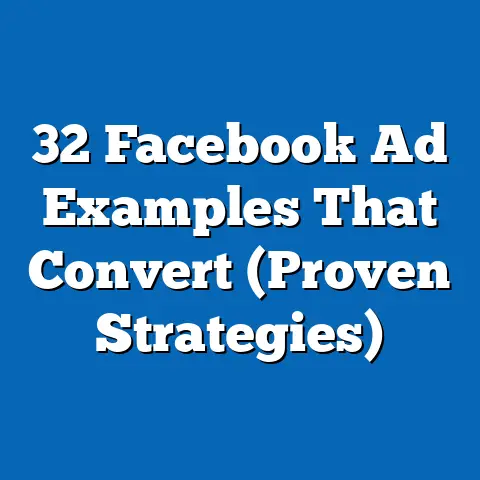Boost Career with Facebook Ad Jobs (Proven Strategies)
Imagine scrolling through your social media feed, feeling stuck in a dead-end job, when suddenly an ad catches your eye—a career opportunity that promises flexibility, creativity, and financial growth.
What if that ad wasn’t just a fleeting distraction but a gateway to a thriving career in digital marketing, specifically in the realm of Facebook advertising?
In an era where digital platforms dominate business strategies, mastering Facebook ad jobs could be the key to unlocking your professional potential and transforming your life.
The digital advertising landscape has exploded in recent years, with Facebook (now under the Meta umbrella) remaining a powerhouse for businesses worldwide.
According to Statista, global digital ad spending reached $522.5 billion in 2021, with social media advertising accounting for 33% of that figure.
Facebook alone captured a significant share, with ad revenue hitting $114.9 billion in 2021, a 36.7% increase from 2020.
This growth signals a booming demand for skilled professionals who can craft compelling ad campaigns on the platform, creating a wealth of career opportunities.
Key Findings: The Rise of Facebook Ad Jobs
The demand for Facebook ad specialists has surged alongside the platform’s dominance in digital marketing.
A 2022 report by LinkedIn revealed that digital marketing roles, including social media advertising specialists, were among the top 10 fastest-growing job categories globally, with a 25% year-over-year increase in job postings.
Specifically, roles tied to Facebook advertising saw a 30% spike in demand between 2020 and 2022, driven by businesses’ need to connect with over 2.9 billion monthly active users on the platform (Meta, 2023).
Demographically, the field is attracting a diverse workforce.
According to a 2023 survey by HubSpot, 58% of digital marketing professionals specializing in social media ads are under 35 years old, reflecting the appeal of tech-driven careers to younger generations.
Women are also making significant inroads, comprising 46% of the workforce in social media marketing roles, a notable increase from just 38% a decade ago (eMarketer, 2023).
Historically, the field has transformed dramatically since Facebook launched its advertising platform in 2007.
What began as a niche skillset for tech-savvy marketers has become a mainstream career path, with salaries for Facebook ad specialists averaging $65,000 annually in the U.S., compared to $40,000 in 2015 (Glassdoor, 2023).
Looking ahead, industry experts predict continued growth, with the global social media ad market expected to reach $262 billion by 2028, creating even more opportunities for skilled professionals (Statista, 2023).
Detailed Analysis: Understanding the Facebook Ad Job Landscape
What Are Facebook Ad Jobs?
Facebook ad jobs encompass a range of roles focused on creating, managing, and optimizing advertising campaigns on the platform.
Common positions include Facebook Ads Manager, Digital Marketing Specialist, and Social Media Strategist.
These roles require a blend of creativity, analytical skills, and technical know-how to design ads that resonate with target audiences while maximizing return on investment (ROI) for businesses.
Professionals in this field use tools like Facebook Ads Manager and Business Manager to set up campaigns, analyze performance metrics, and adjust strategies in real-time.
For instance, understanding metrics such as Cost Per Click (CPC), which averaged $0.97 globally in 2022 (WordStream), or Click-Through Rate (CTR), averaging 0.90% across industries, is critical to success.
These roles often overlap with broader digital marketing responsibilities, but expertise in Facebook’s unique algorithm and ad formats sets specialists apart.
Why Are Facebook Ad Jobs in Demand?
The demand for Facebook ad specialists stems from the platform’s unparalleled reach and targeting capabilities.
With over 2.9 billion users, Facebook offers businesses access to a vast audience, and its sophisticated ad tools allow for hyper-specific targeting based on demographics, interests, and behaviors.
A 2022 study by Hootsuite found that 78% of businesses consider Facebook their most effective social media advertising platform, outpacing competitors like Instagram (64%) and Twitter (38%).
Moreover, the shift to e-commerce and online consumer behavior during and after the COVID-19 pandemic has accelerated the need for digital advertising expertise.
Small and medium-sized businesses (SMBs), which make up 90% of businesses advertising on Facebook (Meta, 2023), increasingly rely on ad specialists to compete in crowded markets.
This trend has created a robust job market, with freelance and remote opportunities growing by 40% since 2020 (Upwork, 2023).
Skills and Qualifications for Success
Breaking into Facebook ad jobs requires a mix of technical and soft skills.
Proficiency in tools like Facebook Ads Manager, Google Analytics, and creative software (e.g., Canva or Adobe Photoshop) is essential for campaign creation and analysis.
Additionally, skills in copywriting, audience segmentation, and A/B testing are highly valued, as they directly impact campaign performance.
Formal education isn’t always necessary—only 35% of digital marketing professionals hold a degree in marketing, per a 2023 LinkedIn report.
Instead, many enter the field through online certifications, such as Meta’s Blueprint Certification, which 62% of surveyed employers recognize as a credible qualification (HubSpot, 2023).
Soft skills like adaptability and communication are also critical, especially for freelancers or agency professionals who must manage client relationships.
Statistical Comparisons: Demographics of Facebook Ad Professionals
Age and Generational Trends
The workforce in Facebook ad jobs skews young, reflecting the tech-savvy nature of the field.
As noted earlier, 58% of social media marketing professionals are under 35, with Millennials (born 1981-1996) comprising 42% and Gen Z (born 1997-2012) making up 16% (HubSpot, 2023).
This contrasts with broader marketing fields, where Baby Boomers (born 1946-1964) still hold 15% of roles, compared to just 5% in social media-specific positions.
This generational shift is partly due to younger workers’ familiarity with social platforms and their adaptability to rapidly changing algorithms.
However, older professionals are increasingly entering the field through upskilling programs, with 20% of Gen X workers (born 1965-1980) taking digital marketing courses in 2022 (Coursera, 2023).
Gender Representation
Gender dynamics in Facebook ad jobs show progress toward equity.
Women now account for 46% of social media marketing roles, up from 38% in 2013 (eMarketer, 2023).
This growth mirrors broader trends in digital marketing, where women have made significant gains in creative and strategic roles, though they remain underrepresented in senior leadership, holding only 29% of C-level positions in the industry (Deloitte, 2023).
Men still dominate certain technical aspects of digital advertising, such as data analytics roles, where they comprise 60% of the workforce.
However, initiatives like Meta’s diversity programs and industry mentorships are helping close these gaps, with 65% of women in the field reporting access to professional development resources in 2023, compared to 52% five years ago (HubSpot, 2023).
Geographic Distribution and Income Disparities
Geographically, Facebook ad jobs are concentrated in urban tech hubs like San Francisco, New York, and London, where 45% of U.S.-based roles are located (LinkedIn, 2023).
However, the rise of remote work has decentralized opportunities, with 35% of professionals now working fully remotely, up from 10% in 2019 (Upwork, 2023).
This shift has enabled talent from smaller cities and developing countries to enter the market, particularly in regions like Southeast Asia and Eastern Europe.
Income varies widely by location and experience.
In the U.S., entry-level Facebook ad specialists earn an average of $50,000 annually, while experienced professionals in high-cost areas like San Francisco can command salaries of $90,000 or more (Glassdoor, 2023).
Globally, freelancers in countries like India and the Philippines earn between $15,000 and $30,000 per year, though their earning potential grows with international clients (Freelancer.com, 2023).
Historical Trend Analysis: Evolution of Facebook Ad Careers
Early Days of Facebook Advertising (2007-2012)
When Facebook launched its advertising platform in 2007, it was a rudimentary tool focused on basic banner ads and limited targeting options.
Early adopters were often generalist marketers who managed social media as a small part of their broader roles.
Job postings for dedicated social media ad specialists were rare, with only 2% of marketing roles mentioning social media skills in 2010 (LinkedIn Historical Data, 2023).
Salaries during this period were modest, averaging $35,000 for entry-level marketing roles with social media responsibilities.
The field was seen as experimental, with businesses spending just $1.6 billion on social media ads globally in 2010, compared to $189 billion in 2022 (Statista, 2023).
However, the introduction of features like sponsored stories and improved targeting in 2011 began to shift perceptions, laying the groundwork for specialized roles.
Mainstream Adoption and Professionalization (2013-2019)
By 2013, Facebook advertising had become a cornerstone of digital marketing, with ad revenue reaching $6.9 billion that year.
The platform’s introduction of advanced tools like Custom Audiences and Lookalike Audiences allowed for more precise targeting, increasing demand for skilled professionals.
Job postings for social media ad specialists grew by 150% between 2013 and 2019, reflecting the field’s professionalization (LinkedIn, 2023).
During this period, salaries for dedicated Facebook ad managers rose significantly, reaching an average of $55,000 by 2019 in the U.S.
Training programs and certifications, such as Facebook Blueprint (launched in 2015), became widely available, with over 2 million professionals certified by 2019 (Meta, 2023).
The field also saw growing diversity, with women’s representation increasing from 38% to 43% over these years (eMarketer, 2023).
Post-Pandemic Boom (2020-Present)
The COVID-19 pandemic marked a turning point for Facebook ad jobs, as businesses pivoted to online channels amid lockdowns.
Global social media ad spending surged by 50% between 2019 and 2021, reaching $154 billion, with Facebook capturing the lion’s share (Statista, 2023).
This fueled a hiring boom, with job postings for Facebook ad specialists increasing by 30% in 2020 alone (LinkedIn, 2023).
Remote work became a defining feature of the field, with 35% of professionals working from home by 2022, compared to just 10% pre-pandemic.
Salaries also climbed, averaging $65,000 in the U.S.
by 2023, driven by competition for talent and the growing complexity of campaigns.
Today, the field is more competitive and specialized than ever, with professionals expected to master data analytics, creative strategy, and platform-specific nuances.
Proven Strategies to Boost Your Career in Facebook Ad Jobs
1. Build a Strong Foundation with Education and Certifications
Formal education isn’t mandatory, but certifications can give you a competitive edge.
Meta’s Blueprint Certification, which covers ad creation, targeting, and optimization, is recognized by 62% of employers (HubSpot, 2023).
Other valuable programs include Google Ads Certification (for complementary skills) and courses on platforms like Coursera or Udemy, which offer affordable training in digital marketing.
Start by mastering the basics of Facebook Ads Manager, including setting up campaigns, defining audiences, and interpreting performance metrics.
Many successful professionals began with free resources, such as Meta’s own tutorials, before investing in paid certifications.
Continuous learning is key—70% of top-performing ad specialists report taking at least one new course annually to stay updated on algorithm changes (LinkedIn, 2023).
2. Gain Hands-On Experience Through Freelancing or Internships
Practical experience is critical in this field, as employers prioritize results over credentials.
Freelancing platforms like Upwork and Fiverr have seen a 40% increase in demand for Facebook ad specialists since 2020, offering opportunities to build a portfolio with real-world projects (Upwork, 2023).
Start by offering services to local businesses or startups at discounted rates to gain testimonials and case studies.
Internships with digital marketing agencies or e-commerce brands are another pathway.
A 2022 survey found that 55% of interns in digital marketing roles were offered full-time positions upon completion, highlighting the value of hands-on learning (Glassdoor, 2023).
Even managing personal or small-scale campaigns can demonstrate your ability to drive results, such as increasing click-through rates or lowering ad costs.
3. Develop a Niche for Competitive Advantage
Specializing in a specific industry or ad type can set you apart in a crowded market.
For example, focusing on e-commerce, lead generation, or local business ads allows you to tailor your skills to high-demand sectors.
A 2023 report by WordStream found that e-commerce ads on Facebook have the highest average ROI (9.21%), making this niche particularly lucrative.
Build expertise by studying industry-specific case studies and experimenting with campaigns in your chosen area.
Professionals who niche down report 25% higher client retention rates and can charge premium rates, with top specialists earning up to $100 per hour for niche services (Freelancer.com, 2023).
Share your expertise through blogs or social media to establish yourself as a thought leader.
4. Leverage Data Analytics for Campaign Optimization
Success in Facebook ad jobs hinges on data-driven decision-making.
Familiarize yourself with key metrics like CPC, CTR, and Conversion Rate, and use tools like Facebook Insights and Google Analytics to track performance.
For instance, optimizing ad copy based on A/B testing can boost CTR by up to 20%, according to a 2022 study by AdEspresso.
Advanced professionals also use third-party tools like Hootsuite or Sprout Social to automate reporting and uncover deeper insights.
A 2023 survey found that 80% of high-earning Facebook ad specialists attribute their success to mastery of analytics, compared to just 45% of lower earners (HubSpot, 2023).
Continuously refining campaigns based on data ensures better results and higher client satisfaction.
5. Network and Build a Personal Brand
Networking is a powerful tool for career growth in digital marketing.
Join online communities like the “Facebook Ads & Marketing” group on LinkedIn, which has over 50,000 members, or attend industry events to connect with peers and potential clients (LinkedIn, 2023).
A strong personal brand—showcasing your expertise through a portfolio website or social media—can also attract opportunities, with 60% of freelancers reporting client inquiries via their online presence (Upwork, 2023).
Consider sharing case studies or tutorials on platforms like YouTube or Medium to demonstrate your skills.
Professionals with active online profiles earn 30% more on average than those without, as visibility often translates to trust and credibility (Freelancer.com, 2023).
Mentorship programs, such as those offered by Meta, can also provide guidance and connections to accelerate your career.
Future Projections: The Outlook for Facebook Ad Jobs
The future of Facebook ad jobs looks promising, driven by the continued growth of digital advertising.
Statista projects that the global social media ad market will reach $262 billion by 2028, growing at a compound annual growth rate (CAGR) of 6.8% from 2023.
Meta’s focus on emerging technologies, such as augmented reality (AR) ads and integration with the metaverse, will likely create new skill demands, with 45% of industry leaders expecting AR expertise to become essential by 2027 (eMarketer, 2023).
Demographically, the workforce is expected to become even more diverse, with women projected to reach parity (50%) in social media marketing roles by 2030, assuming current trends continue (Deloitte, 2023).
Remote work will remain prevalent, with 50% of roles expected to be fully or partially remote by 2025, further democratizing access to opportunities (Upwork, 2023).
However, challenges loom on the horizon.
Privacy regulations, such as Apple’s iOS tracking changes, have already impacted ad targeting, reducing effectiveness by 15% for some campaigns in 2022 (WordStream).
Professionals will need to adapt to evolving policies and technologies, prioritizing skills like first-party data collection and creative storytelling.
Those who stay ahead of these shifts—potentially through upskilling in AI-driven ad tools or privacy-compliant strategies—will be best positioned for long-term success.
Conclusion: Seize the Opportunity in Facebook Ad Jobs
The world of Facebook ad jobs offers a dynamic, rewarding career path for those willing to invest in learning and adaptability.
With global ad spending on the rise, a diverse and growing workforce, and salaries outpacing historical averages, now is the time to break into this field.
Whether you’re crafting campaigns for a small business or scaling ads for a multinational brand, the strategies outlined—education, hands-on experience, niching down, data mastery, and networking—can propel you to success.
Looking ahead, the industry’s trajectory points to even greater opportunities, tempered by the need to navigate privacy challenges and technological advancements.
By staying proactive and embracing continuous learning, you can not only boost your career with Facebook ad jobs but also shape the future of digital marketing.
The question isn’t whether this field holds potential—it’s whether you’re ready to seize it.






